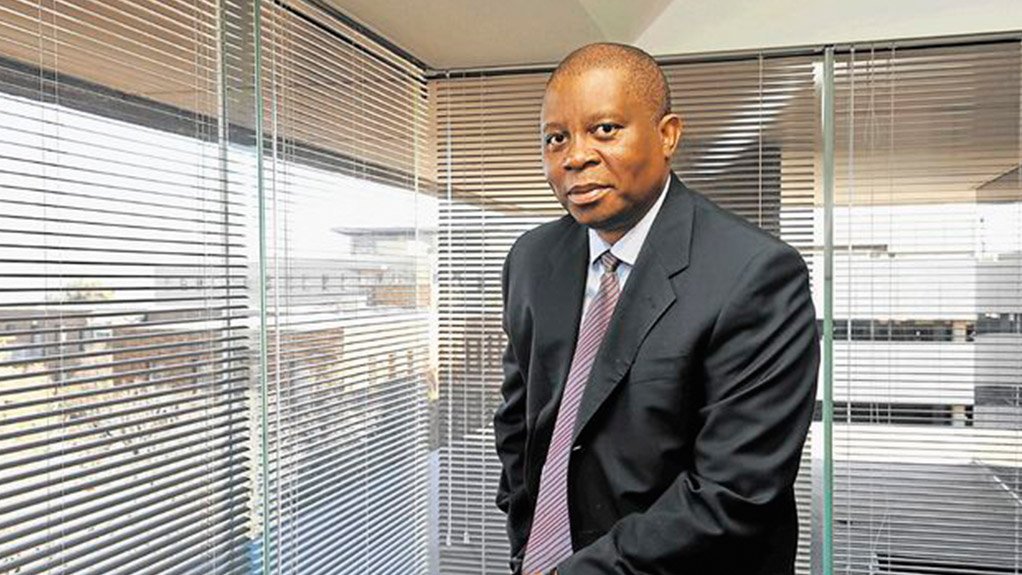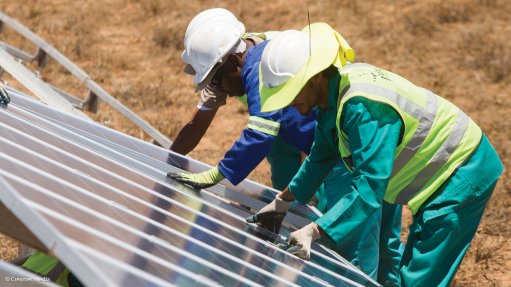Mashaba calls for prioritisation of ‘neglected’ local government basics
Under the Diphetogo banner, which means “real, transformative, lasting change”, City of Johannesburg mayor Herman Mashaba on Tuesday called for the prioritisation of the basics of local government that have been “neglected”.
Some of these basics focus on pressing community needs, youth unemployment, small- and medium enterprises, housing and failing infrastructure.
Delivering his third State of the City Address, in Braamfontein, Mashaba said the multiparty government’s achievement of identifying more than R400-million in nonessential government expenditure and programmes had resulted in those funds having been redirected towards improving essential service delivery to communities in the City of Johannesburg.
With this increased focus, he highlighted the increased capital expenditure (capex) budget allocation on housing, transport, electricity and water from 58% in the 2015/16 financial year, to 71% in the 2017/18 financial year budget.
He further said that the role of an effective government was to create an enabling environment in which the economic potential of individuals and businesses could flourish. In 2018, the City of Johannesburg created 100 000 net new jobs, reducing unemployment by 1.1%.
As a result, the economic growth rate of the city had improved from 1.4% to 1.7% in the 2017/18 financial year.
Further, the City of Johannesburg had facilitated investment of R8.7-billion by the end of 2017/18 financial year. In February this year, unaudited levels of facilitated investment showed that the city had achieved R12-billion of its R16-billion goal for the current financial year, which Mashaba confirmed was on track to be achieved by June.
YOUTH UNEMPLOYMENT
Despite several positive indications, he lamented the youth unemployment crisis as an “epidemic” in the city. In recognising its role in addressing this epidemic, the multiparty government established opportunity centres, which are spaces where the youth and small businesses can be connected to opportunities and services which can assist them in gaining critical skills.
Sponsored by several government organisations and private institutions, the City of Johannesburg launched its first opportunity centre in Marshalltown in 2018. Since then, another three – located in Roodepoort, Diepsloot and Orange Farm Business Centre, in partnership with Discovery – have been launched.
A further three centres – located in Alexandra, Soweto and Randburg – will be launched by the end of this year.
Additionally, Mashaba highlighted that, in the current financial year, 22% of the city’s procurement spend had been directed towards small businesses. Through these efforts, 23 277 small businesses have been supported to date.
The multiparty government has also instituted programmes specifically aimed at targeting and benefiting unemployed youth within the city.
In the past year, 200 artisans underwent training administered by the city as part of a joint pilot project with the University of Johannesburg and, by the end of this year, the city will also be poised to launch the Work Seekers’ Database, which will be made available to the private sector and serve to promote the unemployed in Johannesburg, to companies that are hiring.
“It is our belief that we will be able to lead work seekers with employment opportunities through this database in a manner unlike anything seen before. The database will serve as a resource where qualifying persons can register to benefit from temporary work opportunities in the city on a fair and rotational basis,” the mayor said.
INCENTIVISING INVESTMENT
Further, Mashaba reaffirmed the city’s commitment to creating an enabling environment for economic growth and job creation. To give effect to this commitment, the mayor noted that, in the 2019/20 financial year, the city would be introducing a new investment incentive package, which was aimed at incentivising labour in sectors that have growth potential.
Before the end of this year, the City of Johannesburg’s development planning department will also be launching a new online applications process, through which all development applications of less than 500 m2 will be fast-tracked, with online progress reports made available to applications.
HOUSING
Considering that many City of Johannesburg residents still live under the legacy of apartheid spatial planning, the city has partnered with the private sector to create quality affordable housing within the city.
Of the city’s 500 derelict buildings, 84 properties have been awarded to the private sector to be developed into housing and space for small businesses and start-ups who are unable to afford higher rentals. This has generated R2-billion in investment so far, and created over 11 000 construction jobs, and produced more than 6 500 housing units and opportunities.
“These spaces will help generate quality low-cost housing for the poorest residents close to the places of work at a scale and speed that the government cannot provide. It will also allow us to provide much needed student accommodation within the inner city as well as supporting small businesses that are desperate for space to grow,” the mayor said.
In February, the city council adopted the Inclusionary Housing Policy, which demands and incentivises developers to dedicate 30% of new residential developments to affordable housing.
According to the mayor, the policy seeks to ensure that densities are increased in a manner that facilitates the coexistence of residents belonging to varied income profiles.
The densification process will be implemented in and around current nodes, as well as the new general urban zones in areas like Orlando, in Soweto.
While the policy is meant to deal with future housing developments, the city has been hard at work to address present demand and past housing backlogs, which is currently conservatively estimated at 300 000 units, with 160 000 people still on the housing list.
Owing to this backlog, Mashaba called for the city’s approach to be a “multidimensional one”, which would involve a combination of RDP and social housing, as well as informal settlement upgrades, site and services projects, and partnerships with the private sector.
In the mixed-income housing space, the city has provided over 6 261 units over the last two years, despite declining grant funding from the national government. Simultaneously, the city will be delivering over 4 000 sites and service stands in the 2019 calendar year.
Additionally, the multiparty government has increased spending on infrastructure repair and maintenance from 2% spend, to just over 5% by the end of this financial year.
ELECTRICITY
During his address, Mashaba said there was a way for the city to never experience electricity outages as a result of problems at State-owned Eskom again.
In addition to expenditure on repairs to substations and switching cables from copper to aluminium to prevent theft, the mayor intends to go private by entering into a partnership with independent power producer, the Kelvin power station.
Mashaba said a team from the city was meeting with Kelvin’s management to negotiate a new contract that would see their output increased and sold to the city at a cheaper rate.
If this is achieved, the city would have the licence to procure 600 MW from Kelvin, he said.
Meanwhile, in the current financial year, City Power will have concluded the refurbishment of several power substations, including, but not limited to, those of Roosevelt, Sebenza, Heriotdale and Wilropark.
By the beginning of the 2019/20 financial year, City Power will have concluded its work on the Eldorado Park and Hopefield substations.
Comments
Press Office
Announcements
What's On
Subscribe to improve your user experience...
Option 1 (equivalent of R125 a month):
Receive a weekly copy of Creamer Media's Engineering News & Mining Weekly magazine
(print copy for those in South Africa and e-magazine for those outside of South Africa)
Receive daily email newsletters
Access to full search results
Access archive of magazine back copies
Access to Projects in Progress
Access to ONE Research Report of your choice in PDF format
Option 2 (equivalent of R375 a month):
All benefits from Option 1
PLUS
Access to Creamer Media's Research Channel Africa for ALL Research Reports, in PDF format, on various industrial and mining sectors
including Electricity; Water; Energy Transition; Hydrogen; Roads, Rail and Ports; Coal; Gold; Platinum; Battery Metals; etc.
Already a subscriber?
Forgotten your password?
Receive weekly copy of Creamer Media's Engineering News & Mining Weekly magazine (print copy for those in South Africa and e-magazine for those outside of South Africa)
➕
Recieve daily email newsletters
➕
Access to full search results
➕
Access archive of magazine back copies
➕
Access to Projects in Progress
➕
Access to ONE Research Report of your choice in PDF format
RESEARCH CHANNEL AFRICA
R4500 (equivalent of R375 a month)
SUBSCRIBEAll benefits from Option 1
➕
Access to Creamer Media's Research Channel Africa for ALL Research Reports on various industrial and mining sectors, in PDF format, including on:
Electricity
➕
Water
➕
Energy Transition
➕
Hydrogen
➕
Roads, Rail and Ports
➕
Coal
➕
Gold
➕
Platinum
➕
Battery Metals
➕
etc.
Receive all benefits from Option 1 or Option 2 delivered to numerous people at your company
➕
Multiple User names and Passwords for simultaneous log-ins
➕
Intranet integration access to all in your organisation





















